Q. Is it possible to help one of your children once they
have become an adult? Is it possible to change a relationship with an adult
child? Our daughter has been remote, resentful and unrevealing since college. We
have tried to talk with her, but nothing works. I know we have to let go and
let her find her own way in life but we see no changes happening and she is
nearly forty. When we attempt to talk she denies any problems. I think she’s
also drinking too much. How can we help?
A. It is very difficult to help someone who doesn’t want
help. This is especially true for parents of adults. We all carry some childhood
issues into adulthood. Until we work these out we avoid the influence of our
parents. Your daughter’s inner struggle may be one of trying to be independent,
trying to appear adequate, or she may have resentments about perceived
unfairness, neglect or abuse.
We can change things by changing the way we relate to our
adult child - being more understanding and empathic. To change things, do the
following:
1. Reach out to your adult child. Show interest in what she
is interested in. Be positive and notice her achievements. Study your adult
child and learn about her. Look for
facets of her personality you never discovered before. Focus on positives and
let her know what you admire about her.
2. Ask for forgiveness for any wrong you have done as a
parent. All parents make mistakes. We yell when we know this hurts. We’re busy
or tired and we push our child away. We’re critical or even abusive. Confess
your mistakes of the past to your adult child and ask for forgiveness.
3. If she shares a problem with you, listen carefully, be
understanding and recognize her pain and struggle. Don’t lecture. Don’t preach.
Don’t over react. Be confident in her ability to solve the problem. Give advice
only if she asks you for it and then give it tentatively. “I’m not sure what I
would do in that situation but I might...”
4. Share from your heart rather than from your head and use
“I” statements. Don’t say, “You’re
drinking too much. You may end up a drunken bum.” Do say, “I’m worried and
concerned about your drinking and I wonder what is hurting you so much that it
causes you to drink.”
5. Use word pictures. Describe your feelings or how you see
the relationship in a word picture. This avoids stirring up a person’s
defensive response and it often helps the other person understand us. For example, “Remember how the turtle you had
as a child always pulled into his shell when anyone was nearby. Sometimes when
I try to talk with you it reminds me of your turtle.”
6. Give your love unconditionally. Do your eyes light up
when you see your adult child? Do you let your adult child know how happy you
are to see her, talk with her, spend time with her? Do you give hugs, pats on
the back and say “I love you”? Let her know that you love her though you may
not like her distancing behavior.
7. Pray for your adult child. Prayer helps us let go of
worry. It helps us let go of things we can’t control. Prayer also allows God to
work in the life of our child and in our relationship.
For more help with connecting with children of any age read The Gift of Honor and The Blessing both by Gary Smalley and
John Trent, Ph.D.
“Love each other with genuine
affection, and take delight in honoring each other.” Romans 12:10 NLT
Blessings, Dottie



